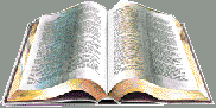Mary Suydam
![]() Department of Religion
Department of Religion
Mary Suydam
Religious Studies 225: The New Testament

Prof. Mary Suydam Fall 2002
Class: MWF 11:10 - 12
Phone PBX 5067
Ascension 309
Office Hours: T-Th 10-12
Email: suydam@kenyon.edu
Goals of the Course: This course is an introduction
to the New Testament, focusing primarily on the four gospels (Matthew, Mark, Luke, and John) and some of the letters
of Paul. We will learn how these books came to be written, who wrote them, and their intended audiences.
We will learn about some of the methodologies (source, form, and redaction criticism) that scholars use to study
the New Testament. We will study the many (and sometimes competing) approaches to Christianity within the ancient
world. We will particularly focus upon differing views of Jesus and his message within the New Testament.

Required Texts:
Harper Collins Study Bible.
Gospel Parallels. B. Throckmorton (Nelson Press), 5th edition.
From Jesus to Christ. Paula Fredriksen (Harper-Collins Press).
Lost Christianities. Bart Ehrman.. (New York: Oxford University Press, 2005).
Suggested Texts (we will be reading portions of these texts):
Who Wrote the New Testament? Burton Mack. (San Francisco: Harper San Francisco, 1995).
Jesus: Apocalyptic Prophet. Bart Ehrman. (New York: Oxford University Press,).
There will also be E-res and Course Reserve Readings.
Class Format: This class is organized as a collaborative exploration with the professor as guide. There will be occasional presentations by the teacher. Classes will focus on serious discussion of the readings. You should come to class each day prepared to discuss the reading for that day. You should also bring the relevant reading materials. Plan especially on bringing the Bible and Gospel Parallels every day. Some classes will begin with a problem-solving or analytical exercise related to the topic to be discussed in class. Then we will discuss our theories and strategies. There will also be weekly written assignments (see below).
Course Requirements:
1. Attendance and Participation: 20%. Regular attendance is a requirement of this course. This course is structured as a collaborative exchange of information between students and professor. The format of the class is a combination of lecture and discussion, with emphasis on discussion and exploration of texts together. Active discussion of the topics is a critical component of this class. If you are present for every class but never say a word, that is a C. Missing more than two classes will lower your final grade by one full point (B becomes C, for example). You will be given written feedback on your participation midway through the course.
2. Weekly writing assignments: 20% There will be weekly writing assignments each week to aid in preparing for discussions of the texts. These assignments will focus on the methodology for reading the texts and your discoveries as you apply these critical tools.
3. Exegesis Paper: 20%. This will be a critical examination of a portion of New Testament text. For detailed instructions on this assignment, click Exegesis Paper Instructions. Exegesis papers are due October 11.
4. Group Project: 20%. This project will allow you to apply what you have learned in the course to a specific topic related to contemporary debates about the New Testament. The reason there are debates is because there is conflicting evidence on these issues within the New Testament texts. As a group you will have to analyze the relevant texts for your topic, study some competing views about these texts, come to an informed decision about them, and present your findings to the rest of the class. For a list of topics and detailed instruction on this assignment, click Group Project Instructions. Class presentations will occupy the last week of class. The information presented will be part of the material on the final exam. See List of Group Members.
5. Final Exam: 20%. The final exam will test your ability to think critically about the texts you have studied, including aspects of the class presentations. It will be an open book exam.
Topics and Reading Assignments
Week 1, August 26, 28, 30: The New Testament World
Readings: From Jesus to Christ, chapters 2,4, 5
Assignment: gospel beginnings: compare the actual beginnings of each gospel (Matthew, Mark, Luke, and John) with your original ideas about how they begin or ought to begin. Write a 1-2 page paper about your reactions to this comparison: surprises, questions, issues you would like to know more about.
Week 2, September 2,4,6: Composition of the New Testament
Readings: From Jesus to Christ, chapter 1
The Lost Gospel of Q, chapters 1-2
E-res: Jesus, Apocalyptic Prophet (Bart Ehrman)
Assignment: The triple tradition: Gospel Parallels #52, pages 42-43
Week 3, September 9, 11, 13: Q
Readings: The Lost Gospel of Q, chapters 5-7
Gospel Parallels, #167, 2, 18, 19
Assignment: The double tradition: Gospel Parallels, 26, 27, and 35.
Week 4, September 16, 18, 20: Form Criticism
![]() NO CLASS MONDAY,
SEPTEMBER 16: YOM KIPPUR
NO CLASS MONDAY,
SEPTEMBER 16: YOM KIPPUR
Readings: Gospel Parallels, #69, 53-54, 86
Week 5: September 23, 25, 27: Paul
Readings: From Jesus to Christ, chapter 8
Assignment: Pauline terminology
Week 6: September 30, October 2,4: Paul and Mark
Readings:
Monday: E-Res, Burton Mack, Paul's Letters to the Greeks and Romans
Paul's Letter to the Romans
Wednesday: From Jesus to Christ, chapter 6 and 177-185
Gospel Parallels, #91, 93, 95
Assignment: Gospel Parallels, #105, 106
OCTOBER BREAK: OCTOBER 7-8
Week 7: October 9, 11: The first Christian communities
Exegesis Papers due Friday, October 11
Choose Topics for Group Presentation.
Week 8: October 14, 16, 18: Mark continued
Readings: From Jesus to Christ, 44-52
Lost Gospel, chapter 9
Assignments for Wednesday and Friday: Passion Narrative
Week 9: October 21, 23, 25: Matthew
Readings: From Jesus to Christ, 185-191, 36-44
Lost Gospel, chapter 10
Week 10: October 28, 30, Nov. 1: Luke
Readings: From Jesus to Christ, 191-198, 27-36
Course Reserve: Ehrman, Jesus, Apocalyptic Prophet, chapters 8-10
Assignment for Wednesday: Themes in Luke
Meet with instructor to go over data for group presentations.
Week 11: Nov. 4, 6, 8: John
Readings: From Jesus to Christ, 198-204, 19-26
Study Assignment for Wednesday: Themes in John
Study Assignment for Friday: Johannine Dualism
Week 12: Nov. 11, 13, 15: The New Testament in context: Acts
Study Assignment for Monday: John's Passion Narrative
Study Assignment for Wednesday: Read the first four chapters of the Book of Acts. Jot down three major themes that are established.
Read also: E-res: Mack, Who Wrote the New Testament, chapter 9: "Inventing Apostolic Traditions"
Study Assignment for Friday: Read the book of Acts, chapters 5-13.
Readings: Lost Gospel, chapter 11
From Jesus to Christ, chapter 10
Week 13: Nov. 18, 20, 22: Early Christian Communities
Readings:
Monday:
I and II Timothy; Titus; James
E-Res: Jesus, Apocalyptic Prophet of the New Millennium (chapter 14)
E-Res: Pagels, Gnostic Gospels, "The Controversy over Christ's Resurrection"
Wednesday:
Lost Gospel, chapters 12-13
Colossians, chaps 1-4; Hebrews, chapters 5-10.
Assignment: Visions of the Cosmic Christ
Friday: E-Res, non-Canonical gospels
November 20: Dress Rehearsal: Groups 1 and 2
Thanksgiving Break
Weeks 14 and 15: December 2, 4, 6, 9: Class Presentations:
December 2: The New Testament and Anti Semitism
December 2: Dress Rehearsal: Groups 3 and 4
December 4: The New Testament and Women
December 6: The New Testament and "Family Values"
December 9: The New Testament: Peace or War?
Final Exam